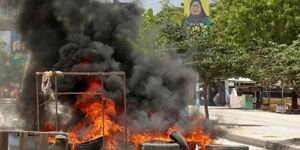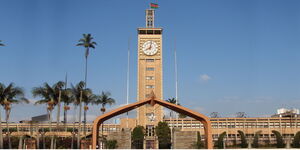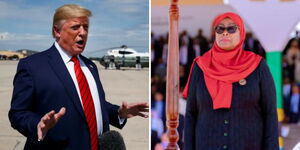Prime Cabinet Secretary Musalia Mudavadi has explained how Kenya secured the release of Boniface Mwangi following a four-day detention in Tanzania.
In a statement, Mudavadi revealed that a one-on-one meeting with the Tanzanian Minister of Foreign Affairs was the breakthrough in ensuring Mwangi’s release.
“We use our diplomatic channels, often behind the scenes, to engage with our friendly countries to resolve difficult issues,” he stated.
“In the current situation, I used the established diplomatic channels to personally engage with my counterpart in Tanzania’s Ministry of Foreign Affairs and, as you are aware, the matter has been resolved amicably,” Mudavadi noted.
Mudavadi was speaking after the vocal activist was found alive on Thursday, May 22, in Ukunda after being deported by road from Tanzania.
The development was confirmed by his family and lawyer James Wanjeri, who disclosed that he had been rushed to the hospital for a medical review. Mwangi was later airlifted to Nairobi, with Wanjeri noting that he could not walk properly.
Images of the activist after the ordeal emerged online, showing Mwangi in a deplorable state, clad in white shorts and a white vest. Other activists joined Mwangi and his wife in Ukunda moments after his discovery.
Earlier on Thursday, concerns over the activist’s whereabouts nearly escalated into a diplomatic row, with the Kenyan government accusing Tanzanian authorities of withholding information on Mwangi’s status.
He had been missing since Monday, after he flew to the East African nation to attend the court hearing of opposition figure Tundu Lissu.
Even so, Mudavadi urged Kenyans to respect the norms and laws of Kenya’s neighbours, championing diplomacy as a means to curb conflict.
Mudavadi, who doubles up as the Foreign Affairs CS, pushed Kenyans to see the bigger picture, citing the need for good relations with Kenya’s neighbours.
“Kenya encourages the freedom of expression as enshrined in its Constitution. We should not assume that how we engage in Kenya can be replicated outside our borders. Respect for our neighbours' norms and laws is imperative,” Mudavadi noted.
“We should tread carefully and deliberately when dealing with neighbours, ensuring that the needs of one do not disrupt the prosperity of others and the socio-economic relations built over decades,” he added.












